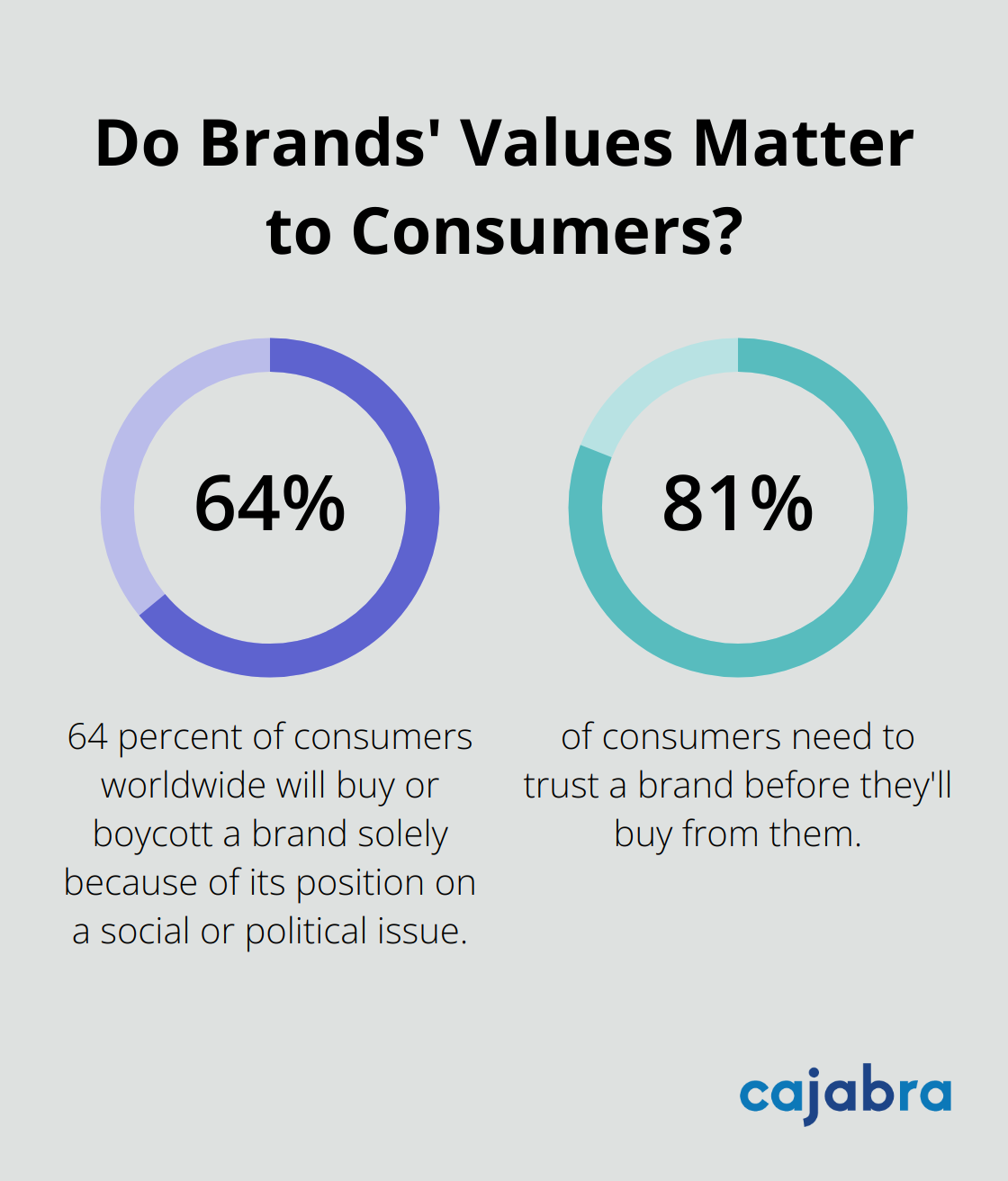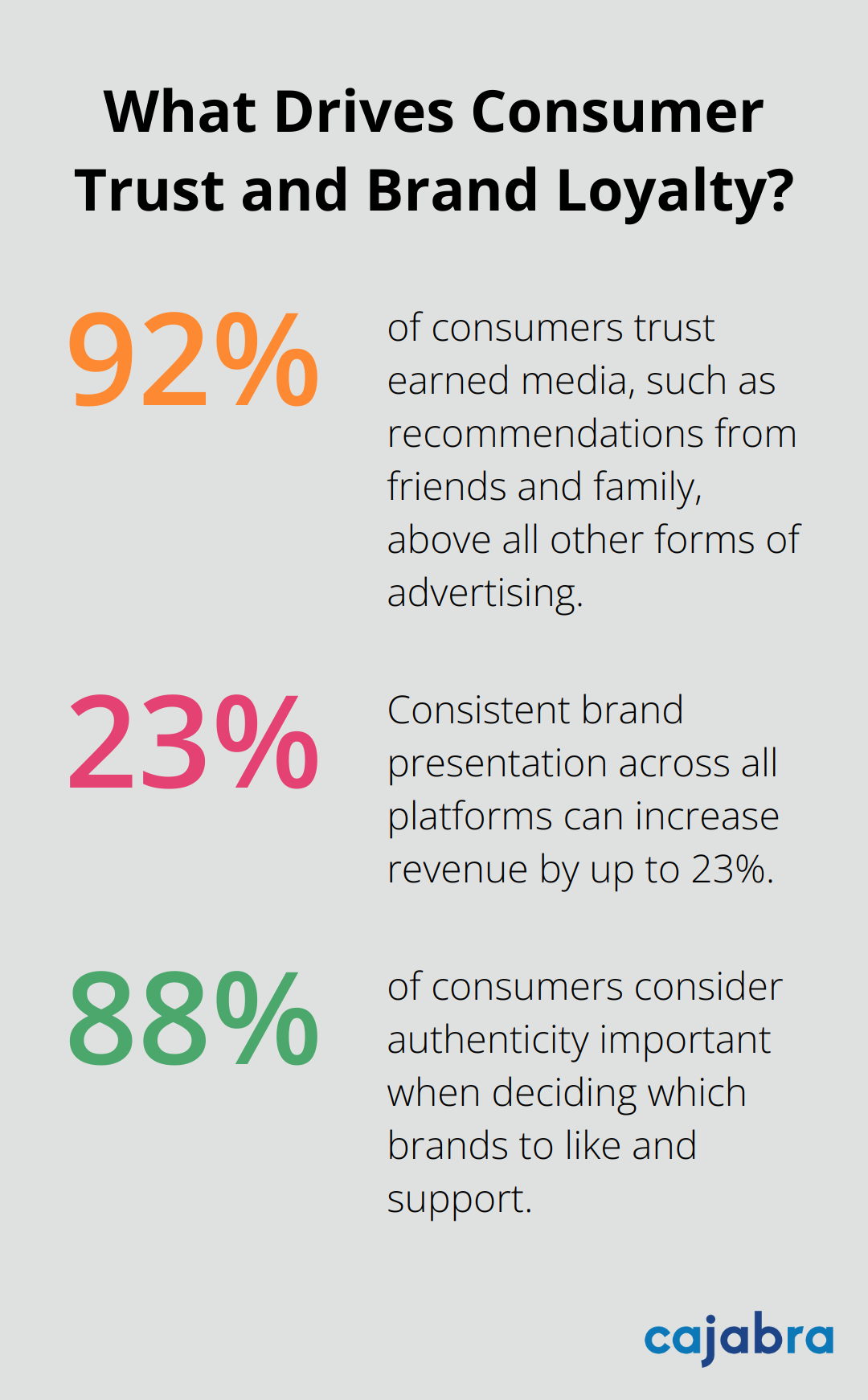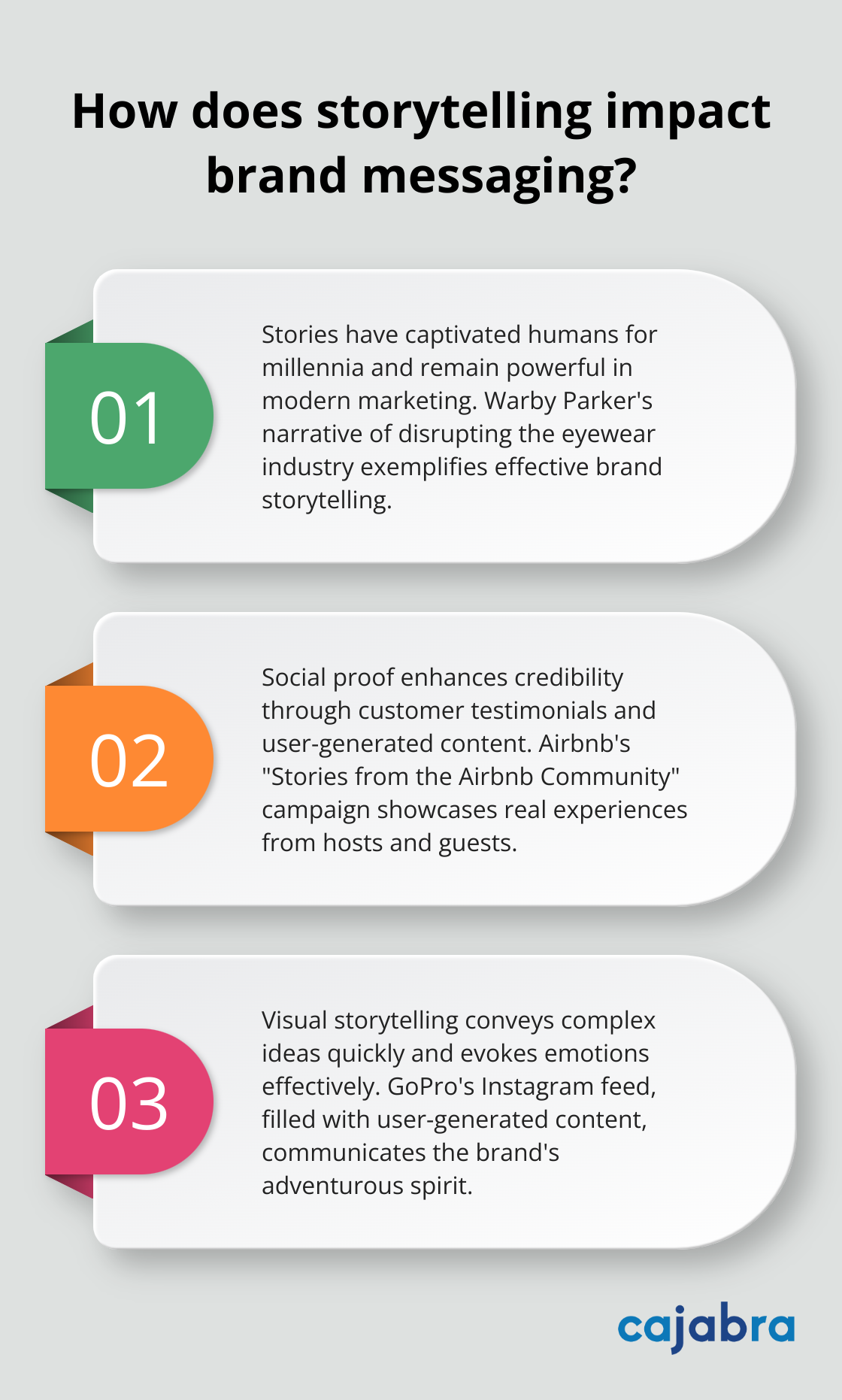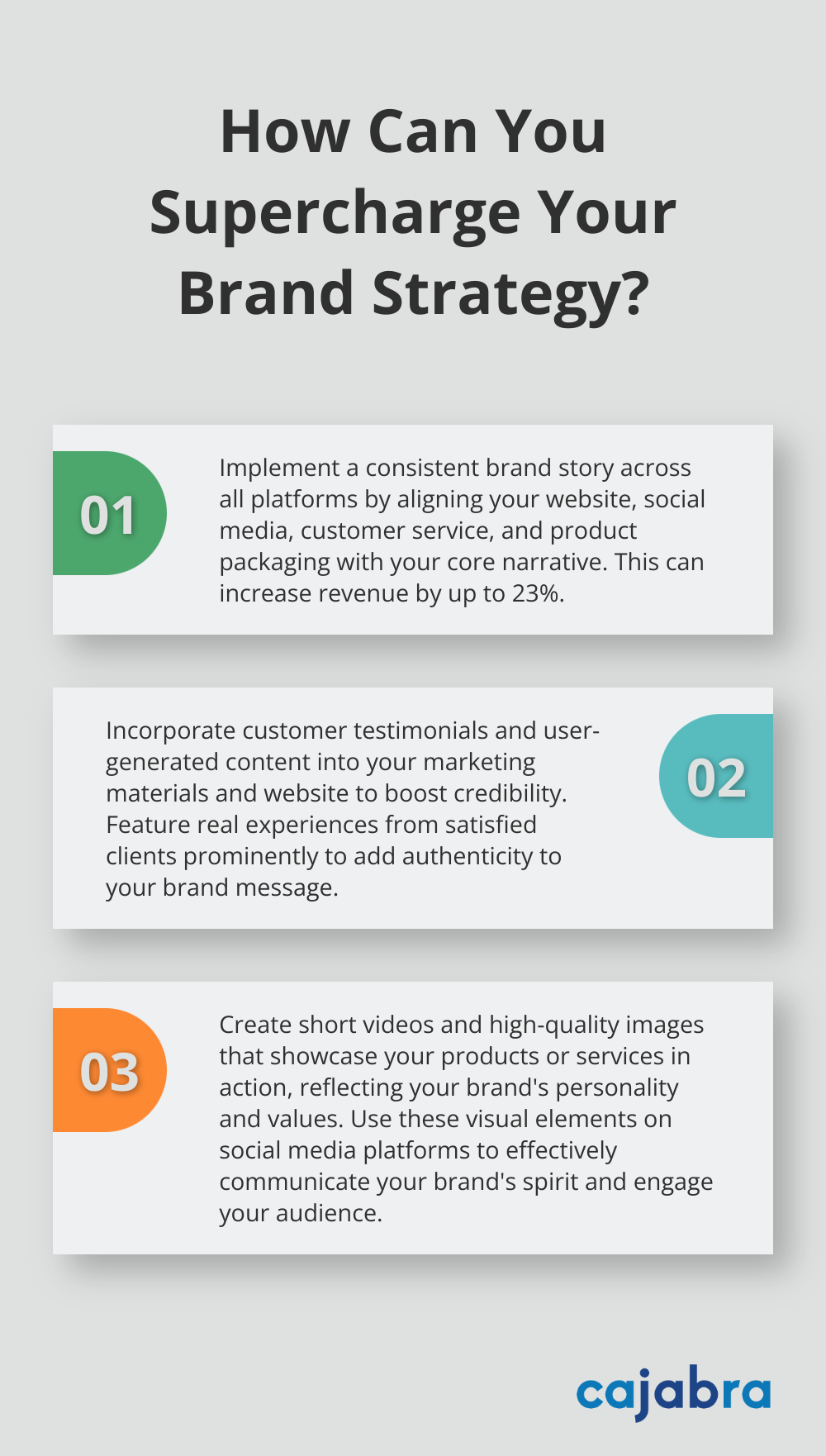
In today's crowded marketplace, standing out is harder than ever. At Cajabra, LLC, we know that a creative messaging strategy is the key to capturing your audience's attention and building lasting connections.
Brand storytelling goes beyond mere marketing; it's about crafting a narrative that resonates with your customers on a deeper level. This blog post will explore how to create compelling brand stories that not only differentiate your business but also foster trust and loyalty among your target audience.
Brand stories are not just marketing fluff; they are powerful tools that transform businesses. At their core, brand stories create deep connections with customers, helping companies stand out in a sea of competitors.
People don't buy products; they buy into stories. A study by Headstream revealed that if people love a brand story, 55% are more likely to buy the product in the future. This statistic underscores the importance of narratives that resonate with your audience on an emotional level.

To create these emotional bonds, companies should focus on shared values and experiences. Patagonia's brand story, for example, centers on environmental activism, attracting customers who share their passion for conservation. When a brand aligns its story with customers' values, it creates a sense of belonging that transcends mere transactions.
In today's saturated markets, a unique brand story can become a secret weapon. An Edelman report found that nearly two-thirds (64 percent) of consumers around the world will buy or boycott a brand solely because of its position on a social or political issue. This demonstrates that a well-crafted brand story can significantly differentiate a company.
Companies should identify what makes their brand truly unique to leverage this advantage. Is it the origin story? The mission? The approach to customer service? Once pinpointed, this unique aspect should weave into every facet of brand communication.
Trust forms the foundation of any lasting relationship, including those between brands and customers. A compelling brand story builds this trust by showcasing a company's values, mission, and authenticity.
The 2019 Edelman Trust Barometer Special Report revealed that 81% of consumers need to trust a brand before they'll buy from them. Sharing a brand's journey (including both successes and challenges) creates transparency that fosters trust.
Moreover, when customers trust a brand, they're more likely to become loyal advocates. A study by Motista found that customers with an emotional connection to a brand have a 306% higher lifetime value and stay with a brand for an average of 5.1 years (vs 3.4 years for those without such a connection).
As we move forward, it's clear that brand stories play a pivotal role in shaping customer perceptions and driving business success. The next section will explore the key elements that make these stories truly effective.
Authenticity forms the foundation of any compelling brand story. In an era where consumers face a barrage of marketing messages, they've honed their ability to detect insincerity. A Stackla study revealed that 88% of consumers consider authenticity important when deciding which brands to like and support, with 50% saying it's very important.

To achieve authenticity, brands must embrace transparency about their journey. This includes sharing both triumphs and setbacks. Airbnb, for instance, openly discusses how they overcame early challenges, which humanizes their brand and builds trust with their audience.
Clear brand values and a well-defined mission prove essential for creating a story that resonates. The 2018 Edelman Earned Brand study found that 64% of consumers choose, switch, avoid or boycott a brand based on its stance on societal issues.
Patagonia exemplifies this alignment. Their mission to "build the best product, cause no unnecessary harm, use business to inspire and implement solutions to the environmental crisis" permeates every aspect of their brand story. This clear connection between values and mission has earned them a fiercely loyal customer base.
A brand story loses its impact if it lacks consistency across all platforms and touchpoints. A Lucidpress study indicates that consistent brand presentation across all platforms can increase revenue by up to 23%.
This consistency requires that your brand story reflects in everything from your website and social media to your customer service interactions and product packaging. Starbucks excels at this, maintaining a consistent narrative of creating a "third place" between work and home across all their touchpoints.
Effective brand stories often feature relatable characters or personas (which could be founders, employees, or even customers). A Nielsen study found that 92% of consumers trust earned media, such as recommendations from friends and family, above all other forms of advertising.
Dollar Shave Club masterfully used their founder as a relatable character in their viral launch video, which helped catapult the brand to success. By putting a face to the brand, they created an immediate connection with their audience.
As we move forward, we'll explore specific techniques that can help you craft these compelling brand messages, turning your story into a powerful tool for customer engagement and business growth.
Stories captivate humans for millennia, and they remain powerful in modern marketing. Structure your brand message like a story, with a clear beginning, middle, and end. Identify your brand's origin story or core mission. Highlight the challenges you've faced and overcome. Showcase how your solutions benefit customers.

Warby Parker's story of disrupting the eyewear industry by offering affordable, stylish glasses directly to consumers exemplifies this approach. This narrative explains their business model and positions them as innovators and problem-solvers.
The voices of satisfied customers speak louder than any marketing claim. Incorporate customer testimonials and user-generated content into your brand messaging to boost credibility and trust.
Ask your happy clients to share their experiences. Feature these testimonials prominently on your website, social media, and marketing materials. Airbnb's "Stories from the Airbnb Community" campaign showcases real experiences from hosts and guests, adding authenticity to their brand message.
In our increasingly visual digital world, images and videos serve as powerful tools for brand messaging. Visual content conveys complex ideas quickly and evokes emotions more effectively than text alone.
Create infographics to present data in an engaging way. Develop short videos that showcase your products or services in action. Use high-quality images that reflect your brand's personality and values. GoPro's Instagram feed (filled with user-generated content showing their cameras in action) effectively communicates the brand's adventurous spirit.
While emotional connections matter, don't underestimate the power of hard facts. Incorporate relevant data and statistics into your brand messaging to lend credibility to your claims and help you stand out as an authority in your field.
When discussing marketing services, don't just say they work - highlight specific outcomes. For example, Cajabra's JAB System™ moves accountants from overlooked to overbooked in just 90 days. This specific timeframe gives potential clients a concrete expectation and demonstrates confidence in the system's effectiveness.
Always cite your sources when using external data. This transparency enhances your credibility and allows interested parties to verify the information.
Understand your target audience's needs, pain points, and preferences. Craft messages that directly address these aspects. Use language and tone that resonates with your specific audience.
For instance, if you target small business owners, focus on how your product or service saves time and money (two precious resources for this demographic). If you aim at millennials, emphasize sustainability and social responsibility in your messaging.
Creative messaging strategies form the core of successful brands in today's competitive marketplace. We explored the power of brand storytelling, its key elements, and techniques for crafting compelling messages. Authenticity, emotional connection, and consistency play vital roles in developing your brand's narrative.

Take a fresh look at your own brand story and identify what makes your company unique. Communicate your values and mission in a way that resonates with your target audience. A well-crafted brand story will differentiate you from competitors, build trust with customers, and foster long-term loyalty.
At Cajabra, we help accounting firms develop powerful brand stories and marketing strategies. Our JAB System™ moves accountants from overlooked to overbooked in 90 days (securing retainer-based clients and maximizing revenue). We offer tailored solutions to enhance your online presence and position your firm as an industry leader.



